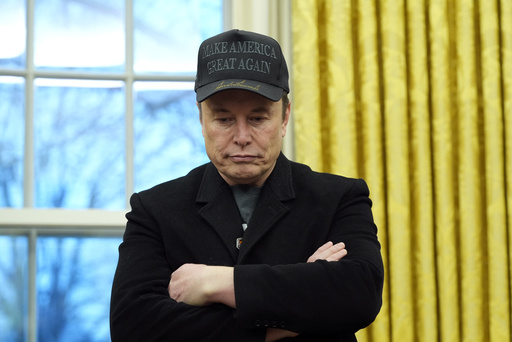
WASHINGTON — In a notable public engagement on Tuesday at the White House, Elon Musk, a key adviser to President Donald Trump, defended the sweeping reforms he is advocating across federal agencies. Musk, who brought along his young son, acknowledged the presence of errors in their strategy and conceded that more mistakes are likely to arise as they push for significant reductions in government operations.
While standing before the Resolute Desk, Trump commended Musk and his Department of Government Efficiency for exposing what they termed “shocking” instances of unnecessary expenditure within the federal budget. The President proceeded to sign an executive order that would amplify Musk’s authority and facilitate further downsizing of the federal workforce.
In his first media appearance since his appointment as a special government employee, Musk characterized himself as transparent amid criticism regarding the concentrated power he wields with limited oversight. He humorously compared the scrutiny he faces to a “daily proctology exam,” attempting to lighten the mood surrounding ongoing discussions about accountability.
Despite Musk’s assertions that information about their initiatives was being communicated via their website and X, the platform he owns, many journalists discovered that the DOGE website offered scant details, particularly about which programs would face cuts. Furthermore, recent actions by the administration suggested a trend towards reducing external monitoring, as evidenced by the abrupt dismissal of the inspector general at the U.S. Agency for International Development just after he raised alarms about potential difficulties in overseeing $8.2 billion allocated for humanitarian aid due to DOGE’s restructuring efforts.
Musk advocated for the reforms spearheaded by DOGE, labeling them as “common sense” and refuting any claims that they were extremities. “The people voted for major government reform, and that’s what the people are going to get. That’s what democracy is all about,” he emphasized.
Responding to journalists about incorrect statements relating to U.S. government spending, including a phenomenal figure of $50 million allocated for condoms in Gaza, Musk admitted that inaccuracies in his statements had occurred. He expressed his commitment to quickly rectifying mistakes, noting that DOGE, as an evolving entity, would also experience missteps throughout its rapid transformation initiatives.
Musk acknowledged that while there are capable members within the federal bureaucracy, greater accountability is essential. He described this sector of the government as “unelected,” wielding power that often surpasses that of elected officials.
The executive order signed by Trump mandates that nearly all new hires within government agencies must receive approval from a DOGE representative, signaling a substantial consolidation of power over personnel decisions across the government. The directives stated that agencies should refrain from replacing career positions deemed unnecessary unless determined otherwise by the agency head. Additionally, the Office of Management and Budget emphasized a hiring cap of one new employee for every four employees lost, with exceptions for critical sectors like immigration and public safety.
Meanwhile, agency leaders were tasked with planning for potential large-scale layoffs, prioritizing the elimination of non-essential government functions as dictated by statutory requirements.
The administration’s strategies to incentivize federal workers to voluntarily resign in exchange for financial packages are currently stalled, pending judicial scrutiny of their legality. This deferred resignation initiative, often referred to as a buyout option, has reportedly attracted over 65,000 applicants, allowing employees to leave while still receiving compensation until the end of September.
In a display of solidarity, several hundred individuals gathered for a rally near the U.S. Capitol on Tuesday to advocate for the rights of federal employees. Janet Connelly, a graphic designer with the Department of Energy, expressed her frustration over continual communication from the Office of Personnel Management encouraging her to consider the buyout. Attempting to filter these messages out, she noted her unwillingness to accept the offer, stating, “From the get-go, I didn’t trust it.”
Connelly underscored the significance of her work for the public good, arguing, “It’s too easy to vilify us.” There are growing fears and feelings of anxiety within the federal workforce, as articulated by Helen Bottcher, a former EPA employee and current union representative in Seattle. Bottcher remarked, “They’re worried about their jobs. They’re worried about their families.”
Senator Patty Murray, a Democrat from Washington, criticized the drive that has emanated from Musk and Trump and stated that government workers “deserve better than to be threatened, intimidated, and pushed out the door.” She highlighted the importance of retaining experienced personnel, warning that governmental functions would falter without their presence.
A government attorney, who requested anonymity due to concerns of retaliation, described the current climate for federal employees as intimidating. She mentioned worries that their digital communications were under surveillance, and as a single mother contending with personal pressures, she was advised to pursue employment in the private sector. Doubts about the deferred resignation program lingered for her, noting that accepting such offers might compromise workers’ rights to legal recourse if promised compensation was unfulfilled. “The idea,” she stated plainly, “was insane.”

